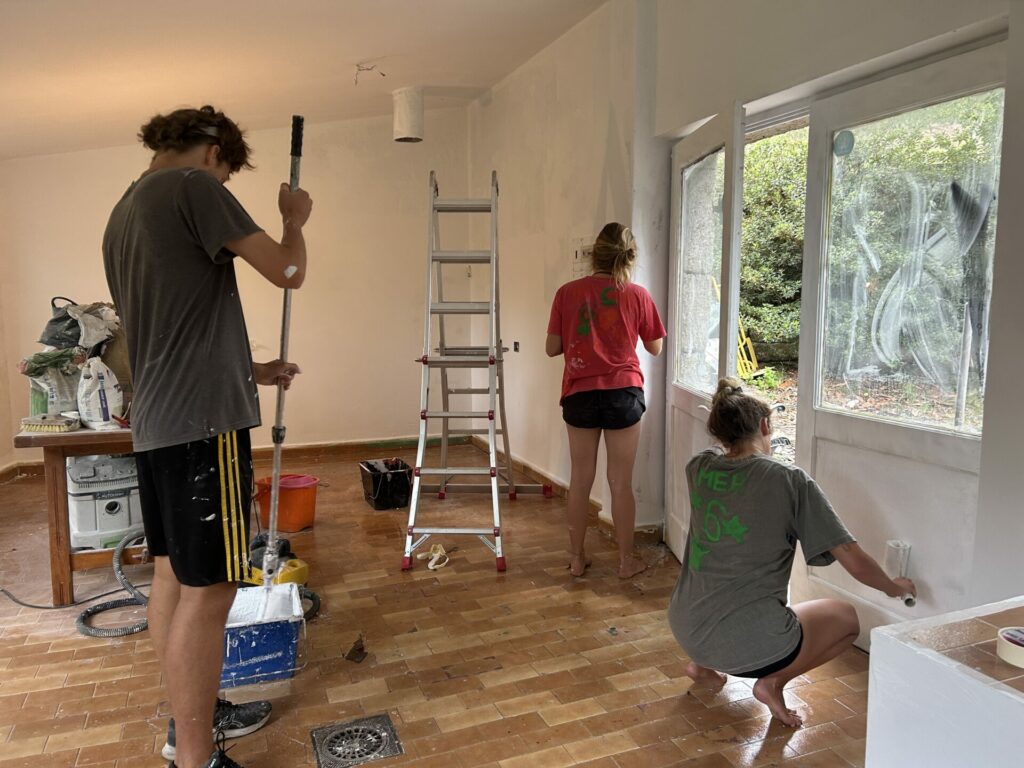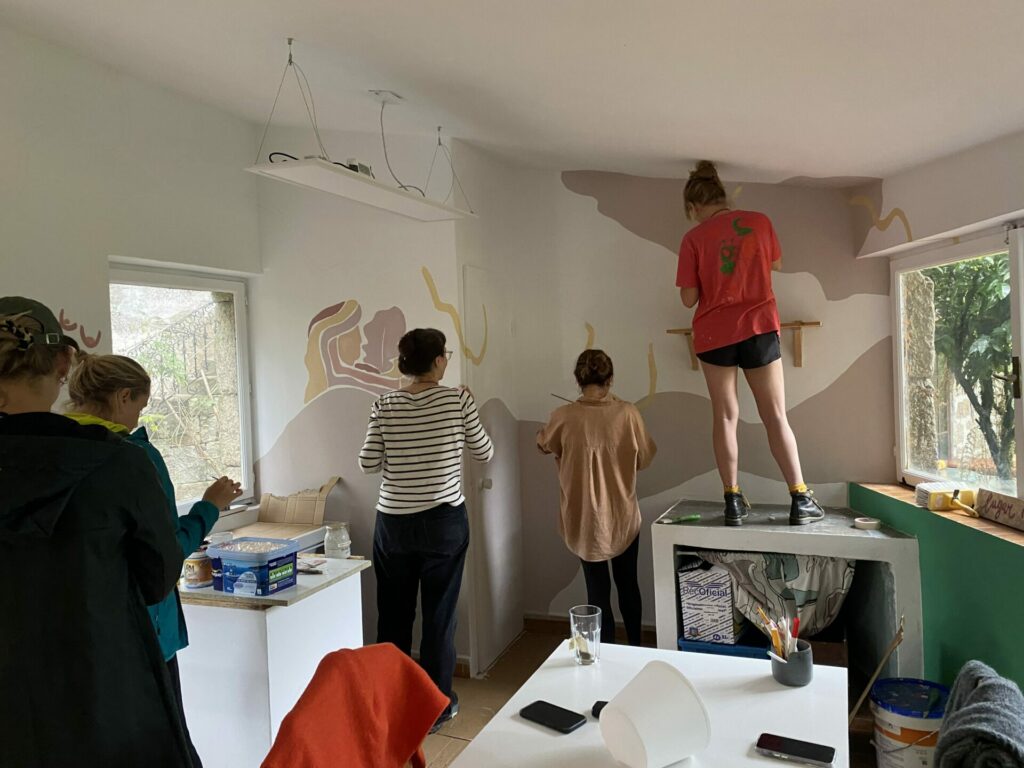Done is better than perfect in our rural coliving space
I believe this expression encapsulates our philosophy at our rural coliving space. Since we began four years ago, our approach has been centered around prototyping, testing, and continuous improvement. We never strive for perfection right from the outset. Neither do we attempt to refine every detail from day one. Instead, we prefer conducting concept tests to determine the viability of our ideas. As Edo, co-founder of Sende and a close friend from whom I learn every day. He emphasizes, it’s far more productive to adopt the 10% improvement technique. This entails making incremental improvements of just 1% each day. The premise is simple: by consistently making small enhancements, positive habits accumulate over time.
As Rome wasn’t built in a day, neither are our endeavors. Additionally, Agustin, a skilled hacker and founder of Anceu coliving, has been instrumental in teaching me this approach. This technique is widely used in programming. It’s about creating a first prototype and observing its outcomes. I believe that the pursuit of perfection often leads to unwanted destinations. I’m delighted that this mindset guides our lives.
When embarking on the journey to establish a maker community through our rural coliving space. My foremost conviction was to wholeheartedly embrace this philosophy and approach to doing things.
Of course, please feel free to share your story of creating a maker community through a rural coliving space in a village in Galicia.
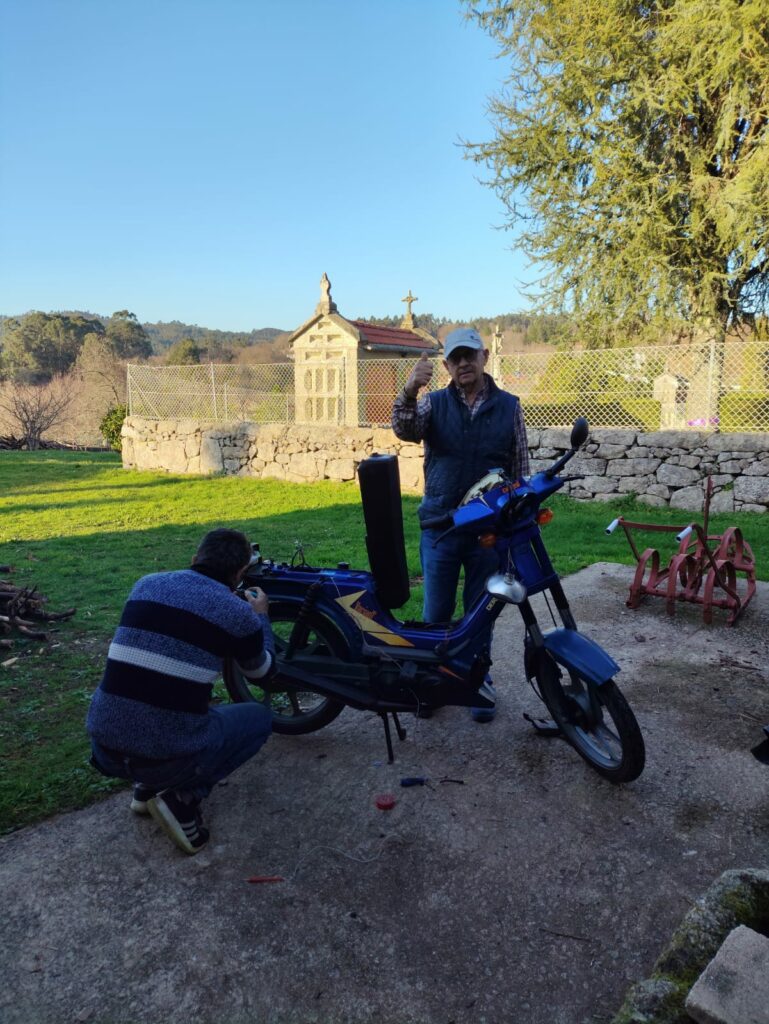
First step: Using technology to develop simple solutions in rural communities
Our first step was move to a rural area, and create a rural coliving space that inherently attracts a large international community from the programming world. Nowadays, technology has enabled us to enjoy the option of living anywhere. Over 500 people have passed through Anceu, with the vast majority coming from the technology sector.
Interestingly, many of these individuals, in addition to their professional skills, have a genuine interest in contributing their knowledge to the world. However, as a digital nomad, it’s not easy to make a meaningful contribution to projects when you only stay in one place for a month or less. That’s why we at Anceu began helping these maker minds to get closer to the village to exchange knowledge. Specifically, our coliving companion, Edouard, from France, after several months at the coliving, began developing a project we call Rural Makers.
Rural Makers focused on implementing a technological solution to address the challenge of manually monitoring water meters, which often results in delayed leak detection and potential water shortages. By leveraging real-time water measurement and cloud-based data analysis, the project aimed to provide a user-friendly dashboard for monitoring water consumption, enabling prompt identification of anomalies and facilitating timely intervention. With collaborative efforts from the coliving community and Anceu village residents, the project progresses through brainstorming sessions, design, prototyping, documentation, and continuous improvement, culminating in a final event to showcase the innovative solution developed to enhance water management in the area.
This experience has begun to broaden our minds regarding the possibilities for community engagement, participation, and creativity by linking real challenges of the village with technology and innovation. However, we recognize the need to seek appropriate inspiration to further drive our efforts forward.
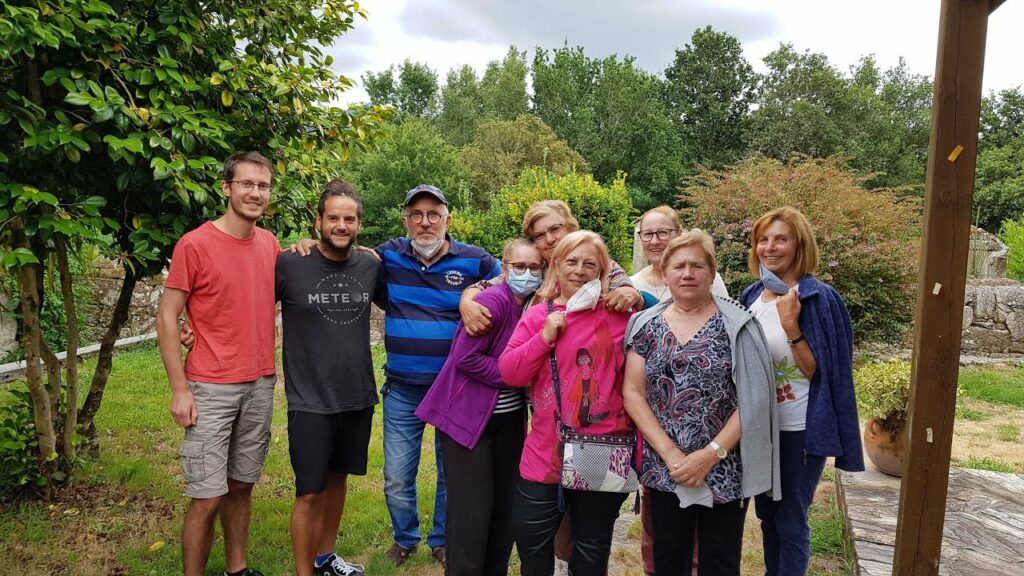
Looking for inspiration at international maker spaces
I have always believed that the best way to learn is by surrounding oneself with people who are much smarter than oneself. From this curiosity comes surprise, and from there, learning. In our case, the idea of creating a maker space was further reinforced by someone who crossed our path. We organized the Rural Hacking workshop thanks to the European Creative Hubs Network. Among the 26 participants, Tom Macpherson-Pope captivated us, reaffirming our belief that this idea made sense. For about four years, he has managed the maker space The Making Rooms in Blackburn, Manchester.
Thanks to Tom’s initial reflections, we realized the importance of visiting other spaces. There we’d understand what kind of machines could be useful for the projects we wanted to materialize. He introduced us to other technological networks closely aligned with the maker philosophy, such as Repair Cafe, Precious Plastic, Fab Lab, and Vulca. He showed us real-life cases of people who use technology as a fantastic tool to promote social change.
The Making Spaces Workshop
In the next network workshop, we headed to Blackburn to visit this place that has become our reference space. The workshop was called The Making Spaces. Of course, the representative of the Anceu community in this meeting was Agustin. He returned fascinated not only by all the technological knowledge but also by interesting ideas to put into practice:
- The importance of not purchasing machines without first consulting with the maker spaces in Spain to determine what is most suitable, to avoid potential issues with repairs later on.
- The significance of building networks with educational institutions to ensure that the machines reach the youth. Specifically, in Blackburn, collaboration with the university is very strong to instill the maker philosophy and experimentation.
- Starting with a 3D printer is one of the most basic and straightforward ways to begin creating things.
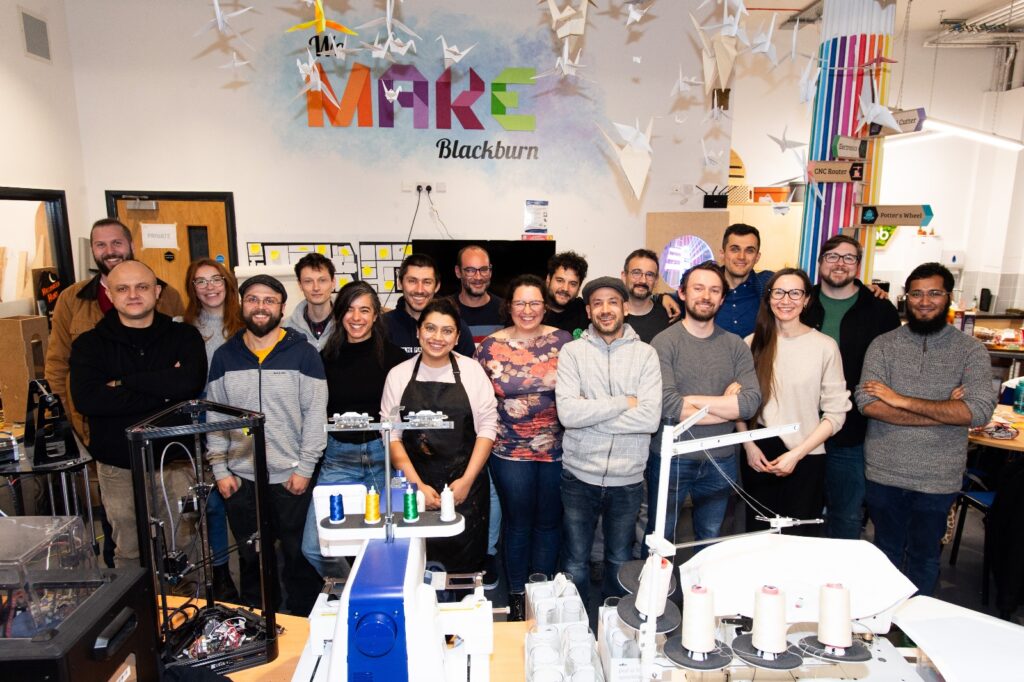
Looking for rural inspiration from a village and Fab Lab Leon
In February 2024, we were invited by the Valles de Omaña y Luna Biosphere Reserve. Within this framework, the group Omaña y Luna Hacendera Abierta: Knowledge, Rural Environment, and Technology” emerged. They were aiming to create a learning space in the Biosphere Reserve. The goal is to promote community building among anyone interested in contributing to the conservation of the territory. Through collaboration and the integration of traditional knowledge and new technologies, fostering vibrant rural areas.
On February 24th, a special Winter Hacendera took place in Canales-La Magdalena, where we visited and had the opportunity to meet the founders of the Fab Lab in León. Visiting the space with Nuria allowed us to discover various machines and possibilities. As Tom suggested, connecting with a maker space in Spain enabled us to know where to acquire machines and seek advice. Additionally, this event marked the beginning of Fuchiqueria, as we recognized the importance of hosting regular events to build a community of makers interested in hands-on activities. living in a rural area doesn’t mean isolating oneself.
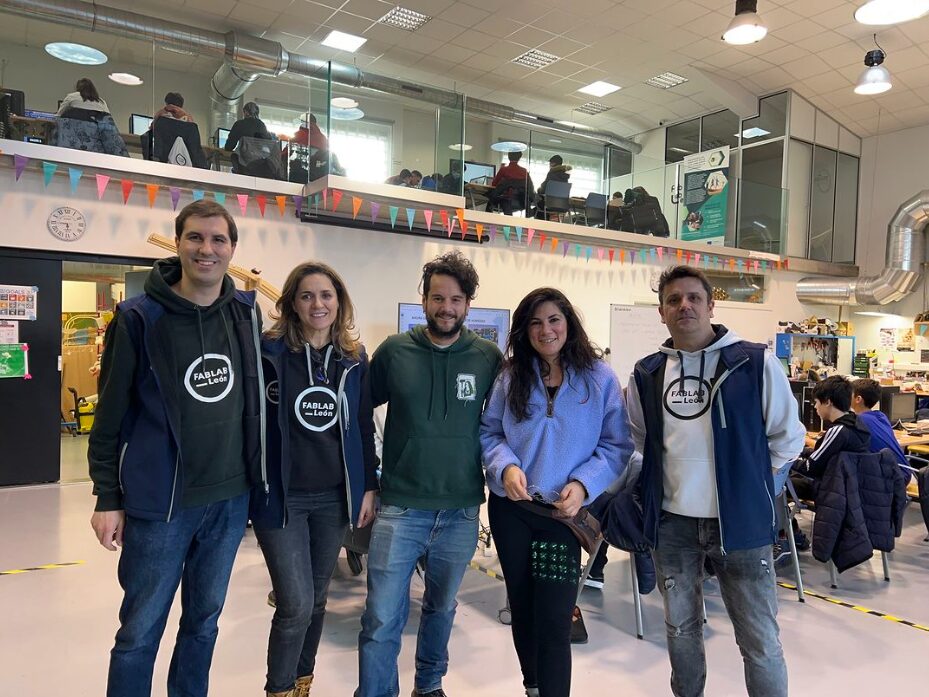
A Fuchiqueira, our first maker event in the rural area
Thanks to attending this event, we realized that amidst our numerous projects, it’s sometimes challenging to pause and continue learning and experimenting with our own maker materials. Therefore, after spending an entire day with tech and creative individuals from the village, we decided that we should do the same from our rural coliving space.
Thus, Fuchiqueira was born. Fuchiqueira is a Galician word that aptly describes the art of curiosity. This April, we will commence A Fuchiqueira, monthly intergenerational meetings to explore disciplines of art, technology, and creativity. We will host it in the Communal House of the village. During the three-hour sessions, each person with a bit of knowledge can teach others. In our inaugural meeting, we’ll experiment with individuals skilled in various areas:
- Agus from Eleven Yellow will enlighten us on programming and 3D printing machines.
- Lotte will demonstrate sewing with upcycled materials.
- Ivan will guide us in repairing an old computer to give it new life, aiming to provide it to someone in need.
- Africa will lead experiments with biomaterials, exploring the possibility of making molds with reused coffee grounds.
- Rogelio will instruct us in playing the traditional game “A Malla.”
- Nacho from Rural Hackers will assist with WordPress website doubts and provide insights into starting with artificial intelligence for everyday life.
- Lastly, with Rosario or Granero, we’ll learn to cook paella and Galician pancakes, a typical dessert for Carnival, akin to our Galician version of crepes.
From Fuchiqueira to a rural maker space
We believe that A Fuchiqueira’s monthly learning will lead us to our very real next step. This step is creating our own physical space to house all our machines. In fact, the space is already ready and prepared. We rebuilt it last summer with our own hands. And the best part is its views, overlooking nature, and the forest that helps us rethink.
Our “atelier” has been transformed into a maker space where we can work with art, creativity, and machines. We blend technology and art like true rural hackers! Thanks to the collaboration of our colivers and the valuable assistance of our neighbors from the village, we have carried out a series of significant improvements. We have learned how to change a roof, apply whitewash, and sand walls. With the help of AI, we have created an interior design prototype.
